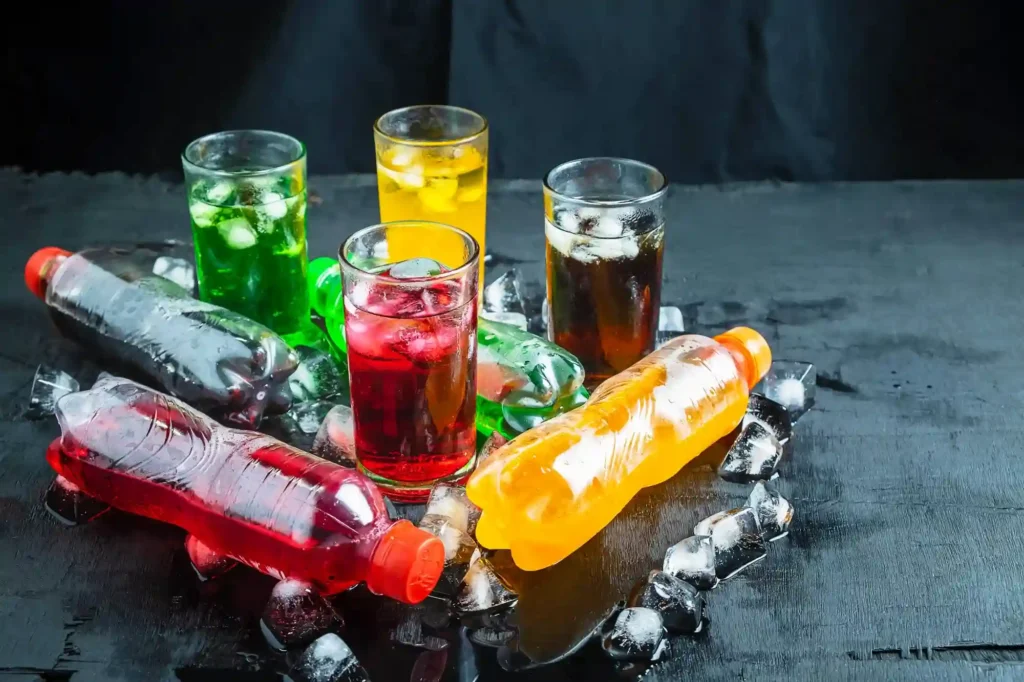Introduction: The Sweet Revolution That’s Transforming UK Retail
The low sugar drinks market in the UK has exploded in 2025. Walk into any store today and you’ll see what I mean. Shelves that once held only sugary sodas now stock amazing zero-sugar options that taste just as good.
Here’s what’s happening right now:
- Customers ask for “sugar-free” drinks more than ever before
- Low sugar drinks sales have jumped by 65% in UK stores
- Smart retailers are making serious profits from this change
This guide shows you exactly which low sugar drinks UK customers want most in 2025. You’ll learn which products sell best and how to make money from this £2.8 billion opportunity.
Whether you run a small shop or manage multiple stores, this insider knowledge will help you succeed. Ready to discover what separates winning businesses from those getting left behind?
The UK Low Sugar Drinks Revolution: Government Impact & Market Response
Government regulation frequently transforms entire sectors, and the UK drinks market is a key illustration. The sugar tax not only altered consumer choices; it sparked innovation, reformulation, and an increase in healthier beverage options overall.
How the Sugar Tax Changed Everything
Since its introduction in 2018, the Soft Drinks Industry Levy (SDIL) has prompted manufacturers to modify their products, reduce unnecessary sugar, and reconsider taste profiles, all while remaining competitive in a market that prioritizes health.
Here’s what happened to the market:
- Sugar content dropped by 43% in most soft drinks
- 65% of all drink sales are now low-sugar or sugar-free
- Big brands spent millions making their drinks healthier
- Quayside Wholesaler UK saw demand for low sugar drinks triple since 2020
Real-World Brand Transformations
Leading beverage companies have demonstrated that reducing sugar does not equate to reducing profits. Those who embraced change early have transformed health-focused reformulation into profitable ventures
Success Stories:
- Coca-Cola – Made Zero Sugar available in 8 different flavours
- AG Barr – Cut Irn-Bru sugar in half but kept the taste people love
- PepsiCo – Made Pepsi Max the top choice for “maximum taste, zero sugar”
Each brand learned that cutting sugar doesn’t mean cutting sales. Quayside Wholesaler UK data shows these reformulated drinks actually sell better than the original versions.
Current Market Statistics (2025)
Current consumers are increasingly health-conscious and mindful of their spending. For wholesalers and retailers, carrying healthier beverage options isn’t a choice — it’s a requirement.
Consumer Behaviour Facts:
- 58% of UK shoppers choose low-sugar options for better health
- 57% say these drinks make them feel healthier every day
- 53% prefer cutting sugar over other diet methods
- 42% buy low-sugar drinks for their whole family
These numbers show that health isn’t about giving up taste anymore. It’s about making smarter choices that still satisfy.
What UK Consumers Really Want in 2025
Understanding your audience is key to boosting sales. Retailers who adapt to shifting buyer preferences in the UK beverage space are leading the market. Here’s what shoppers really care about:
1. Taste Without Compromise
What Customers Say: “It should taste as good as the original”
Consumers are unwilling to settle for taste. Whether it’s a fizzy beverage or juice, they anticipate known, pleasing flavor profiles, free of any unwanted surprises.
What Makes Drinks Taste Great:
- Rich flavours that satisfy cravings
- No weird aftertaste that puts people off
- Familiar tastes with better ingredients
Quayside Wholesaler UK taste-tests every new product before adding it to our range. We only stock drinks that pass our “would I buy this again?” test.
2. Natural vs Artificial Sweeteners: The Clear Winner
Shoppers are examining labels with greater attention than before. In 2025, health-conscious consumers favor natural substitutes for sugar
Top Natural Sweeteners People Love:
Stevia
- Comes from plants, not laboratories
- Zero calories but tastes sweet
- No bitter aftertaste in quality products
Monk Fruit
- Ancient natural sweetener from Asia
- 200 times sweeter than sugar
- Clean taste that customers trust
Erythritol
- Sugar alcohol that tastes like real sugar
- Only 0.2 calories per gram
- Works great in fizzy drinks
Why Customers Avoid Artificial Sweeteners:
Many shoppers still worry about artificial options like aspartame and sucralose. They read labels more carefully now and choose products with ingredients they recognize.
3. Price Sensitivity and Value Perception
Price is always part of the equation—but it’s not just about being cheap. It’s about offering value that justifies the cost.
How Different Groups Think About Price:
Health-Focused Millennials:
- Will pay extra for premium low sugar beverages
- Compare price per serving, not just bottle price
- Buy in bulk when they find products they love
Budget-Conscious Families:
- Want healthy options that don’t break the bank
- Look for multipacks and special offers
- Compare different brands before buying
Value-Seekers in Northern England:
- Focus on getting the most for their money
- Prefer familiar brands at good prices
- Buy larger quantities when prices are right
Wholesale Advantage: At Quayside Wholesaler UK, we negotiate the best trade prices on premium low-sugar beverages. This means you can offer customers quality products at prices that beat the competition.

Top 10 Best-Selling Low Sugar Drinks UK 2025
Wondering which low sugar drinks are flying off the shelves in 2025? Based on real-world sales data from Quayside Wholesaler UK across England, Scotland, and Wales, these products are leading in popularity and profit.
Carbonated Soft Drinks Category
The fizzy drinks that people choose instead of regular Coke and Pepsi. These three dominate sales in every type of store.
1. Coca-Cola Zero Sugar
- The number one selling low sugar drink in the UK
- Available in original, cherry, vanilla, and lemon flavours
- Strong sales in corner shops, supermarkets, and restaurants
- Profit margin: 35-40% for retailers through Quayside Wholesaler UK
2. Pepsi Max
- Second biggest seller, especially popular with people aged 18-35
- Bold taste that doesn’t need explaining to customers
- Great for impulse purchases near checkout areas
- Sells well in gyms and sports centres
3. Diet Coke
- Been around the longest but still sells consistently
- Lighter taste appeals to older customers
- Popular choice for office vending machines
- Reliable steady sales throughout the year
Energy Drinks & Functional Beverages
Low sugar drinks that give people energy without the sugar crash. These products have the highest profit margins in most stores.
4. Monster Zero Ultra
The fastest-growing energy drink in the low-sugar drinks category:
- Zero sugar but full energy boost
- White can design appeals to health-conscious buyers
- Popular with students, gym-goers, and shift workers
- Available in multiple flavours: Ultra Blue, Ultra Red, Ultra Paradise
5. Red Bull Sugar Free
- The original sugar-free energy drink
- Trusted brand with loyal customers
- Small can size perfect for quick energy boost
- Premium price point but customers pay willingly
6. Prime Hydration (Low Sugar Variants)
- Newest brand but growing incredibly fast
- Massive appeal with teenagers and young adults
- Often sells out due to high demand
- Created by popular YouTubers KSI and Logan Paul
Flavoured Waters & Hydration
The healthiest low sugar drinks that still taste great. Perfect for customers who want something refreshing without any guilt.
7. Volvic Touch of Fruit (No Added Sugar)
Simple, natural hydration that customers trust:
- Made with natural fruit flavours
- No artificial sweeteners or colours
- Light, refreshing taste perfect for any time
- Popular with families and health-conscious shoppers
8. Innocent Plus (Reduced Sugar)
- Premium smoothies and juices with less sugar
- Added vitamins make customers feel good about buying them
- Strong brand reputation in the UK
- Higher price point but worth it for the quality
Alternative & Premium Options
These low sugar-smart drinks appeal to customers looking for something different. They often have the highest profit margins.
9. Kombucha (Low Sugar Varieties)
The fermented drink that’s become mainstream:
- Gut health benefits that customers actually want
- Tangy, unique taste that keeps people coming back
- Appeals to health-conscious millennials
- Premium pricing but growing demand
10. Plant-Based Milk Alternatives (Unsweetened)
- Oat milk, almond milk, and soy milk without added sugar
- Used in coffee, cereal, and smoothies
- Growing market as more people avoid dairy
- Steady sales throughout the year
Demographic Insights: Who’s Buying Low Sugar Drinks?
Knowing who buys low sugar alternatives enables you to stock the appropriate items and increase your profit margins. Every demographic possesses distinct preferences, values, and purchasing behaviors. Here’s what you should be aware of:
Millennials: The Primary Drivers (Ages 28-43)
This group spends the most and shops regularly. They value quality and transparency—and they’re loyal to brands that deliver.
Why They Buy Low Sugar Drinks:
- Want to stay healthy as they get older
- Have money to spend on premium products
- Research products before buying
- Share recommendations with friends on social media
What They Buy Most:
- Functional beverages with added vitamins
- Premium kombucha and fermented drinks
- Natural energy drinks for busy lifestyles
- Organic and sustainably-made options
Shopping Habits:
- Read ingredient labels carefully
- Buy online and in-store equally
- Willing to try new brands and flavours
- Prefer brands that support good causes
Gen Z: Digital Natives with Strong Values (Ages 18-27)
This generation cares deeply about brand authenticity and aesthetics. Their choices are often driven by digital culture.
What Motivates Their Purchases:
- Environmental impact matters to them
- Learn about products from TikTok and Instagram
- Support brands that take stands on social issues
- Will stop buying from brands that disappoint them
Their Favourite Low Sugar Drinks:
- Prime Hydration and trendy new brands
- Energy drinks with natural ingredients
- Drinks with innovative, Instagram-worthy packaging
- Brands created by influencers they follow
How They Shop:
- Compare prices online before buying in-store
- Influenced by reviews and social media posts
- Buy products their friends recommend
- Prefer brands that are authentic and honest
Parents: Family Health Advocates
Parents are practical buyers who look for safe, healthy choices, especially those that kids will drink.
Main Concerns When Shopping:
- Keeping children healthy and preventing obesity
- Finding products the whole family will drink
- Getting good value when buying for multiple people
- Choosing safe, natural ingredients over artificial ones
What They Buy:
- Multipacks of popular brands like Diet Coke
- Natural fruit waters for children’s lunchboxes
- Family-size bottles for home consumption
- Products recommended by other parents or doctors
Shopping Patterns:
- Compare nutritional information on labels
- Buy in bulk to save money
- Shop at times when children aren’t with them
- Stick to brands they trust once they find them
Regional Variations Across the UK
Diet-friendly drinks sell differently across the UK. What works in London might not work in Wales. Here’s what Quayside Wholesaler UK data shows about each region.
sell differently across the UK. What works in London might not work in Wales. Here’s what Quayside Wholesaler UK data shows about each region.
Scotland: Leading Low-Calorie Adoption
Scottish customers buy more naturally sweetened drinks than anywhere else in the UK:
- 42% of all soft drink sales are now low-sugar or sugar-free
- Strong response to government health campaigns
- Local brands like sugar-free Irn-Bru still very popular
- Customers willing to pay more for healthier Scottish-made products
London: Premium Wellness Focus
London shoppers want the latest and most expensive low sugar drinks:
- Pay higher prices for innovative functional beverages
- First to try new brands and unusual flavours
- Kombucha and premium waters sell exceptionally well
- Trend-setting market where new products launch first
Northern England: Value-Focused Consumers
Northern customers want healthy drinks but at fair prices:
- Compare prices carefully before buying
- Prefer multipacks and bulk buying options
- Stick to mainstream brands they recognize
- Look for special offers and loyalty discounts
Wales: Traditional Meets Modern
Welsh customers are slowly adopting naturally sweetened drinks but prefer familiar tastes:
- Traditional soft drink preferences still influence choices
- Gradual shift toward healthier options
- Local cultural preferences affect which products succeed
- Balance between trying new things and sticking to favourites
Market Opportunities for UK Retailers & Wholesalers
Thenaturally sweetened drinks market offers serious profit opportunities for retailers who understand how to capitalize on this trend. Smart positioning and supplier partnerships make all the difference.
Convenience Store Success Strategies
Small stores can compete with supermarkets by being smarter about how they display and stock naturally sweetened drinks.
Product Placement That Sells:
Position naturally sweetened drinks where customers see them first:
- Eye level in refrigerated sections gets 40% more sales
- Create a “Healthy Choices” section near the entrance
- Put impulse-buy options like energy drinks near the checkout
- Use shelf talkers to highlight “Zero Sugar” and “Natural” benefits
Smart Inventory Management:
The right product mix makes more profit with less risk:
- Stock 60% mainstream brands (Coke Zero, Pepsi Max, Diet Coke)
- Add 25% energy drinks (Monster Zero, Red Bull Sugar Free)
- Include 15% premium options (kombucha, functional waters)
- Monitor local preferences and adjust monthly
Quayside Wholesaler UK helps convenience stores optimize their low sugar drinks selection based on local demographics and sales data.
Future Market Predictions: UK Low Sugar Drinks 2025-2027
The market for low sugar beverages in the UK is experiencing rapid growth. Success involves not merely adhering to trends; it requires staying in front of them. Retailers that quickly adjust to emerging changes in consumer habits and innovations will take the lead.
Emerging Trends to Watch
Four major changes are coming to the low-sugar drinks market in the next two years. Retailers who prepare now will have a big advantage.
1. Zero-Sugar Energy Drinks Expansion
Once a niche product, zero-sugar energy drinks are becoming a household staple—especially among health-conscious younger adults.
- Natural caffeine from green coffee beans and yerba mate
- Better taste that doesn’t remind people of “diet” drinks
- Sports nutrition crossover products for gym-goers
- Quayside Wholesaler UK expects 40% growth in this category
2. Functional Beverages with Health Benefits
Customers want drinks that do more than taste good:
- Immunity-boosting drinks with real vitamins
- Gut health products with live probiotics
- Mental clarity and focus enhancers for busy professionals
- Recovery drinks for post-workout hydration
3. Premium Natural Sweetener Innovation
The sweetener wars are heating up with better natural options:
- Monk fruit becoming more affordable and widely used
- Allulose providing sugar-like taste without calories
- Advanced stevia extracts that eliminate bitter aftertaste
- Combination sweeteners that taste exactly like sugar
4. Personalised Nutrition Integration
Technology is changing how people choose low-sugar beverages:
- Apps that recommend drinks based on health goals
- Custom formulations based on fitness tracker data
- Subscription services for personalized healthy drinks
- AI-powered product recommendations in stores
Market Growth Projections (2025–2027)
The numbers show strong and consistent upward movement across the board:
| Segment | Projected Annual Growth |
|---|---|
| UK Low Sugar Drinks Market | £3.2 billion by 2027 |
| Functional Beverages | +15% YoY |
| Natural Sweetener-Based Drinks | +22% YoY |
| Zero-Sugar Energy Drinks | +18% YoY |
How to Choose the Right Low Sugar Drinks for Your Store
Having the appropriate beverages isn’t a matter of chance; it requires knowing your clients and providing choices that will encourage repeat visits. Here’s a methodical way to establish a selection that performs well in your local market.
Step 1: Customer Profiling and Local Market Analysis
Start with your shoppers. What they value should shape what’s on your shelves.
Research Your Local Demographics:
Start with basic questions about your customer base:
- What age groups shop at your store most often?
- Are customers more interested in health or price?
- Do local gyms, schools, or offices influence drink choices?
- What time of day do people buy drinks most?
Simple Research Methods:
- Ask customers what healthy drinks they wish you stocked
- Look at your current best-selling drinks for clues
- Check what competitors stock in similar areas
- Monitor social media for local health and fitness trends
Quayside Wholesaler UK provides free demographic analysis for our retail partners to help identify the best low sugar drinks for each location.
Step 2: Product Mix Strategy
Too many options can overwhelm customers. Too few can hurt sales. The sweet spot? A well-balanced range that covers the essentials while keeping things fresh and interesting.
The Proven 60-40 Rule:
This formula works for most UK retailers:
- 60% mainstream brands everyone recognizes (Coca-Cola Zero, Pepsi Max, Diet Coke)
- 40% innovative options that create excitement (kombucha, functional beverages, premium waters)
Category Space Allocation:
How to Break It Down on Shelves:
| Category | % of Shelf Space | Examples |
|---|---|---|
| Traditional Carbonated | 30% | Diet Coke, Coke Zero |
| Energy & Sports | 25% | Prime, Monster Ultra, Red Bull SF |
| Flavoured Waters | 20% | Volvic, Highland Spring Sparkling, Innocent |
| Functional Drinks | 15% | Vitamin Water, Kombucha, Protein Waters |
| Alternative Picks | 10% | Plant-based milks, Specialty blends |
This mix ensures you have something for everyone while focusing on products that actually sell.
Step 3: Wholesale Partnership Strategy
Your supplier isn’t just a vendor—they’re part of your growth strategy. The right partner helps you stay stocked, on-trend, and competitive.
Essential Wholesale Partner Qualities:
Look for suppliers who offer:
- Consistent delivery schedules you can count on
- Competitive wholesale pricing that lets you make good margins
- Help introducing new low sugar drinks to your customers
- Marketing materials and promotional support
Quayside Wholesaler UK Partnership Benefits:
- Exclusive access to trending low sugar drinks before competitors
- Free point-of-sale materials for new product launches
- Flexible delivery schedules that match your cash flow
- Expert advice on local market preferences and seasonal trends
Performance Standards to Expect:
- Order accuracy: 98% or higher on every delivery
- On-time delivery: 95% minimum reliability
- Product freshness: Maximum shelf life remaining
- Customer service: Same-day response to questions or problems
Partner with Quayside Wholesaler UK for expert guidance on building your optimal low sugar drinks range, from local favourites to trending health-focused brands that your customers actually want to buy.
Conclusion
The future of low sugar drinks UK is bright and here to stay. Driven by rising consumer health trends, the shift toward better-for-you beverages is no Low sugar drinks aren’t just a trend—they’re the future of the UK beverage market. From zero-sugar sodas to drinks with added health benefits, consumer demand is shifting toward smarter, healthier choices.
Key Takeaways at a Glance:
- Health-first buying is now the norm, not the exception
- Low sugar is a non-negotiable for many UK shoppers
- Retailers who adapt quickly will win repeat business
- Strategic wholesale partnerships keep your shelves competitive
To succeed in 2025 and beyond, retailers must blend local insights with flexible product strategies—and work closely with reliable wholesalers like Quayside Wholesaler UK to stay stocked, relevant, and profitable.
Frequently Ask Question
UK consumers choose low sugar drinks for three primary reasons: improved health and weight management (58% of consumers), feeling healthier overall (57%), and avoiding artificial ingredients. The shift represents a permanent change in consumer behaviour rather than a temporary trend.
Small stores should stock 3-4 mainstream options (Coke Zero, Pepsi Max), 2-3 energy drinks (Monster Zero, Red Bull SF), 2 flavoured waters, and 1-2 functional beverages. This provides variety while maintaining manageable inventory levels.
The top-selling low sugar drinks in the UK are Coca-Cola Zero Sugar, Pepsi Max, Diet Coke, Monster Zero Ultra, and Red Bull Sugar Free. These products consistently rank highest in sales volume and consumer preference across all major retail channels.
The sugar tax has reduced average sugar content by 43% and shifted 65% of soft drink sales to low/no-sugar variants. It forced brands to reformulate products and educated consumers about sugar content, creating permanent market changes.
Yes, natural sweeteners like stevia and monk fruit are increasingly preferred by consumers and command higher prices. Products with natural sweeteners show 22% annual growth compared to 8% for artificial alternatives, making them more profitable for retailers.





